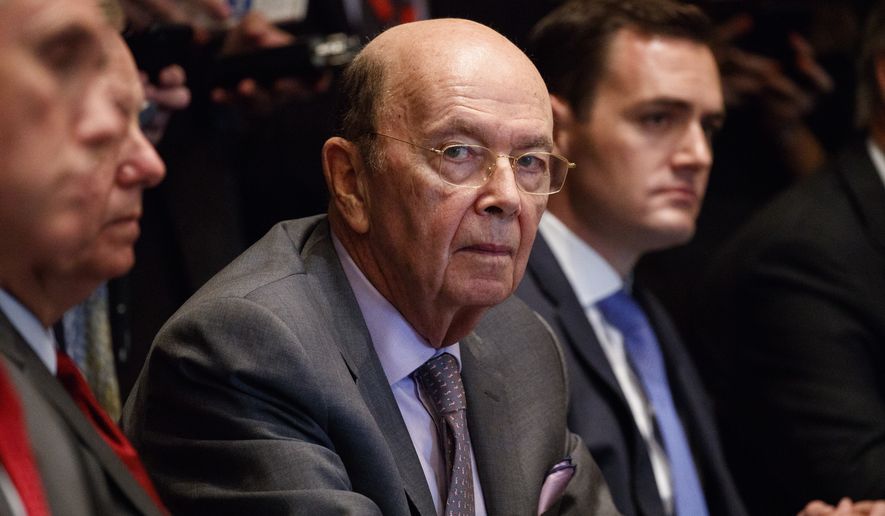Senators of both parties blasted Commerce Secretary Wilbur Ross over President Trump’s steel and aluminum tariffs Wednesday, saying the levies are harming the U.S. economy while doing nothing to stop China’s unfair trade practices.
Senate Finance Chairman Orrin G. Hatch, Utah Republican, said the tariffs are raising prices for certain U.S. manufacturers by 20 percent or more, while retaliatory tariffs by other countries are hurting American farmers.
“I just don’t see how the damage posed on all of these sectors could possibly advance our national security,” Mr. Hatch said. “These tariffs do not support U.S. national security; instead, they harm American manufacturers, damage our economy, hurt American consumers, and disrupt our relationship with our long-term allies, while giving China a free pass.”
Sen. Pat Toomey, Pennsylvania Republican, said the tariffs are provoking a plan by Canada to raise import taxes on U.S. ketchup.
“I wish we would stop invoking national security because that’s not what this is about,” Mr. Toomey said. “This is about economic nationalism.”
Sen. Ron Wyden, Oregon Democrat, said the administration’s major achievement from the tariffs so far “is sowing a lot of chaos.”
“It is also frustrating to watch as the administration’s trade moves seem more like knee-jerk impulses than any kind of carefully thought-out strategy,” Mr. Wyden said.
The administration has imposed tariffs of 25 percent on steel imports and 10 percent on aluminum, primarily to punish China for flooding the U.S. market. Mr. Ross said the import duties “are necessary to revive America’s essential steel and aluminum industries.”
“Idled steel and aluminum capacity is being restarted as we sit here in Illinois, Ohio, South Carolina, Missouri and Kentucky,” Mr. Ross said. “This administration is standing up for American families, American businesses and American workers by taking action to reduce imports that threaten our national security.”
Lawmakers said the tariffs are raising prices for U.S. consumers, and they chided Mr. Ross for his earlier claim that the action would only add a penny to the cost of a can of soup. Mr. Hatch said the tariffs could add several thousand dollars to the cost of an imported car.
“The car isn’t a can of soup. It’s not a can of soup, Mr. Secretary,” Mr. Hatch said. “It is a significant financial commitment for most families often paid for with debt, and I’m shocked that anyone would consider making it more expensive.”
Sen. Johnny Isakson, Georgia Republican whose state is home to the Coca-Cola Co., said “although a couple pennies on a can is not much, a couple pennies times a billion is lots.”
“We’re getting into a war that’s going to cost lots of billions of dollars,” he said. “We need to be careful … and make sure we know where we’re going before we find out we got there and it’s the wrong place to be.”
Mr. Ross also raised alarms on the committee by saying that the Commerce Department has received more than 22,000 requests for exclusion from the steel and aluminum tariffs. The department has been criticized for acting too slowly and arbitrarily on the requests.
“It sounds to me like we’ve got a government-run mercantilist economy, as opposed to a free market economy,” said Sen. Charles E. Grassley, Iowa Republican.
Said Mr. Toomey, “We’re picking winners and losers.”
The bipartisan criticism came on the same day that the European Commission approved tariffs of 25 percent by the European Union on a range of U.S. products starting on Friday in response to U.S tariffs on EU steel and aluminum.
The Commission approved a law imposing the import duties on $3.2 billion worth of U.S. goods, including steel and aluminum; agricultural products such as sweetcorn and peanuts; bourbon, jeans and motorbikes.
“We do not want to be in this position,” EU Trade Commissioner Cecilia Malmstrom said in a statement, adding that the “unilateral and unjustified” U.S. decision had left the EU with no choice.
Meanwhile, German auto makers are proposing to end the EU’s 10-percent import tax on U.S.-made cars, the Wall Street Journal reported Wednesday.
The newspaper reported that U.S. ambassador to Germany Richard Grenell has been in talks recently with the chief executives of German car makers BMW, Volkswagen and Daimler, who said they favor scrapping the levies as part of a broader deal encompassing industrial goods.
But Europe also wants the U.S. to scrap a 25-percent tax on imported pickup trucks, SUVs and big vans, a tariff that has been in place since the 1960s.
Meanwhile, Mr. Ross said Wednesday that the U.S. is launching an investigation of recent steel price hikes to determine whether some entities are “illegitimately profiteering” from new U.S. tariffs.
Mr. Ross told the Senate Finance Committee that the price of steel in the U.S. market has risen far more than it should under the 25- percent tariff, perhaps due to “speculative activity.”
⦁ This article is based in part on wire-service reports.
• Dave Boyer can be reached at dboyer@washingtontimes.com.




Please read our comment policy before commenting.